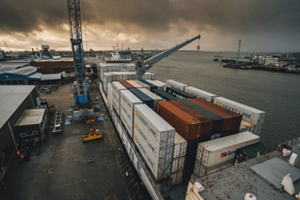ModOPS reports on cost-effective shore power systems for ports

When in port, the majority of ships run on-board generators to supply electrical power; this produces pollution and carbon emissions. Low emission, onshore power supply systems, (OPS), can solve this problem, but its not always clear which system would be most cost-effective for a particular port. The ModOPS project, (Modular Onshore Power Supplies), supported by a DfT Transport Research and Innovation grant (TRIG) delivered by Connected Places Catapult, has modelled different options to highlight the relative merits of a range of OPS technologies. The outputs are intended to accelerate port investment in shore power, improve air quality and reduce carbon emissions.
ModOPS has surveyed over 100 third-party reports to extract the latest knowledge regarding shore power options and the latest energy systems. This research formed the basis for a modular Onshore Power Supply (OPS) model that has analysed the cost and carbon performance of OPS systems for 5 different port use cases, each including comparisons using †12 source energy options.
The results from the analysis have been used to draw key conclusions to guide port decision making regarding Onshore Power Systems. Discussions have also taken place with end-users to validate the research.
The project acknowledges that as demand for shore power expands to meet air quality and carbon emissions targets, ports will increasingly function as major energy hubs, managing incoming energy resources to deliver the shore power services demanded by visiting vessels. This will inevitably require new infrastructure and new capabilities to manage it.
The conclusion of the research is that the preferred OPS solutions for ports will depend on multiple factors including; the portís proximity to high power grid connection; easy access to secure supplies of other energy resources (hydrogen, methanol etc); types of visiting vessels requiring shore power and their duty cycle. For most ports, all-electric OPS systems with some battery storage are likely to be the best option to consider first. Where sufficient grid connection capacity is unavailable, in-port generation using a liquid fuel is likely to be a good option to consider. HVO fuel is a good short-term option, whilst green methanol fuel may become attractive, especially if methanol becomes a mainstream net-zero bunker fuel (as currently seems likely).
A white paper has been created to publish the findings of ModOPS which is available to download here.
To be kept up to date with activities, projects and events in the area of maritime decarbonisation, sign up to the MSE Maritime Decarbonisation Interest Group.
Image courtesy of Portsmouth International Port


